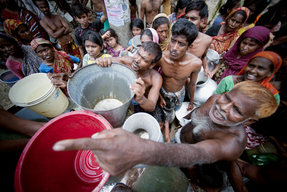 The military supply water in Dhaka (Source: UN/Kibae Park) The military supply water in Dhaka (Source: UN/Kibae Park) Izzy Braithwaite Originally published at: http://www.rtcc.org/2013/05/27/comment-health-overlooked-in-our-response-to-climate-change/ The protection of human health and wellbeing is a central rationale for the emissions reductions called for in the very first article of the UN Framework Convention on Climate Change (UNFCCC). Yet, somehow, the issue is missing from many parts of the UN talks. The growing body of research and evidence in the area over the past couple of decades hasn’t really translated into a broader understanding of how climate change and health are related, beyond a relatively small community of academics and health professionals. Knowledge about the links between climate and health among the public, climate negotiators and environmentalists is often limited and quite superficial. It typically doesn’t stretch far beyond the more direct impacts, such as heatwaves, vector-borne diseases or extreme weather events such as flooding. Indirect effects on health are rarely considered, and both the media and the public tend to frame the impacts of climate change in terms of the risks to ecosystems and species or economic losses; very rarely in terms of its other impacts on people and their health. Perhaps this is part of why climate mitigation and adaptation measures fail to get the levels of both political and financial support they need to tackle climate change and to protect and promote health in the face of it: current levels of adaptation finance, much like current emissions reductions pledges, are grossly inadequate. As a glance at any newspaper or polls about the relative political importance of different topics make clear – most of us are concerned about our own health and the health of those we care about, including that of our children and grandchildren and less visible problems like climate change, which are also delayed in time, often feature far below this on the agenda. Climate change will dramatically affect the health of today’s children and young people, and more than that, policies to promote the health ‘co-benefits’ of sustainability and climate action could greatly improve health. Surely those messages, if communicated more effectively, could be a strong driver to help us achieve the sort of rapid, meaningful changes we need in order to avoid catastrophic climate change - couldn’t they? In the UK, several thousand health professionals have joined the Climate and Health Council to add their voice to a global climate and health movement which already has strong voices in Australia, Europe and the US, along with several other regions, and they are starting to connect up, for example with the Doha Declaration. Doubt is their product... At the same time, communication with negotiators, the mainstream media and the wider public around what’s known about climate and health clearly hasn’t yet been very effective, and has been compounded by the confusion that biased and inaccurate media such as Fox News and the Murdoch empire seek to create. This is very much like the 'merchants of doubt' phenomenon that emerged among tobacco companies as the evidence of tobacco's health risks came to light. One of my friends recently asked me when he saw this video, “if climate change is really such a big health threat, then why don’t most people know that, and why isn’t it mentioned more in the news?” I’m convinced by the evidence that it is – some of it is collected in our resources section– but I found it hard to answer his question. Have we all, consciously or subconsciously, decided that it’s too depressing so we don’t want to know, do the media decide it’s not worth broadcasting, is it related to the success of fossil fuel companies and their PR and lobbying teams, or is it something else? I don’t have the answers, but I think there are many reasons: for one, picking out long-term trends to ascertain what health impacts are attributable to climate change is no easy task, and – especially when it comes to modelling future health impacts which are often highly dependent on socioeconomic factors too – the science is far from simple. Predictions, of necessity, depend on various assumptions and on multiple interacting factors. As with climate change in general, the real-world effects are highly uncertain: not because scientists think health might be fine in a world four or six degrees hotter, but because it’s very hard to work out exactly how bad the impacts may be. Even the World Bank now explicitly recognises that this is what we’re currently on course towards, that it’ll be far from easy to adapt to, and that such a temperature rise would conflict greatly with its mission to alleviate poverty. The dangers of ignoring Black Swans As George Monbiot pointed out in characteristically optimistic style last year, mainstream global predictions for future food availability in the face of climate change may be wildly off – because they’re based only on average temperatures rather than the extremes. A fatal error if this is true that the extremes – droughts, wildfires and so on – could become the main determinant of global food production, interacting with other changes to affect in ways that, like Taleb's 'Black Swan' events, are almost impossible to predict. If this does turn out to be the case, it’s likely that by far the biggest health impact of climate change will be malnutrition, as argued by Kris Ebi, lead author of the human health section of the last IPCC report. Inadequate food intake not only increases vulnerability to infectious diseases such as malaria, TB, pneumonia and diarrhoeal disease, but also kills directly through starvation. Food insecurity, in turn, can force people to migrate just as something more obvious like sea-level rise can, and this can be a driver of civil conflict. Both migration and conflict of course have major physical and health impacts, but their extent and distribution depend on numerous other things; climate is one driver among many. Like any give extreme weather event, it’s hard to attribute indirect effects of climate change such as these to climate change, given how strongly it interacts with other contextual factors. But that doesn’t mean it’s not a causal relationship. As the Millennium Ecosystem Assessment showed in 2005, our health and wellbeing ultimately depends on ecosystem functioning and stability, at levels from local to global. How ecosystems and in turn health are being – and will be – affected by climate change is unavoidably complex. That makes it hard to communicate and hard to use to change policy, but we cannot allow this to stop effective advocacy and action. The fossil fuel industries and the many dubious institutions and individuals they fund will not wait: with billions made from the sale of coal, oil and gas, they are much better organised and resourced than us at present, and they will use every opportunity to maintain doubt, prolong inaction and ensure that our future isn’t allowed to compromise their sales. In order to extend a sense of the importance of climate action beyond the environmental community and to secure broad and deep consensus on the need for concerted action, health must play a much bigger role in decision-making at all levels. Both impacts and health co-benefits need to feature more centrally in national mitigation and adaptation plans, and in our discussions around climate change more generally. That shift won’t happen on its’ own, and with the Bonn UNFCCC intersessionals coming up in June, it strike me that health should be a priority. Better resourcing and a comprehensive work programme including capacity-building, education and raising public awareness on subjects specific to climate and health would be a tangible and positive way to protect and promote health and to reduce the impacts of climate change on the most vulnerable.
0 Comments
Jonny Elliott, from COP18 We've all been there... if you're anything like me, you probably thought you had climate change sussed when you learnt the difference between your NO2 and your CO2, that simple greenhouse effect diagram they teach you about in GCSE Chemistry, or felt like a genius amongst mere mortals when the Kyoto Protocol was mentioned in conversation. But then you're asked for your views on the Bali Roadmap, or a sample NAPA for a non-annex country, and suddenly you've gone blank and all you can muster is a smile... Welcome to Doha, and to the 18th UN Conference on Climate Change. 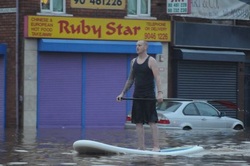 Over the next two weeks, I hope to be able to share with you the ins and outs of what can certainly be a tricky process to get your head around: but don’t let that put you off. I am by no means an expert on the whole UNFCCC process - but as Christiana Figueres, the Executive Secretary of the UNFCCC reiterated earlier at an event this week, ‘none of us are, but we all have our niche.’ As a health professional I strongly agree with the UCL-Lancet commission's statement that ‘Climate change could be the biggest global health threat of the 21st century’ . Our health is essentially dependent on stable, functioning ecosystems and a healthy biosphere. This bedrock for global health is under enormous threat from climate change and ecological damage that we are causing. I don’t know about you, but I’ve known about this problem for quite a few years since early secondary school, but have generally felt powerless to act - and at times questioned whether my efforts would really have an effect. However, as I have connected more deeply with other social justice issues, development and public health I've found that the message of climate change and the irrefutable science behind it keeps reappearing. This isn’t just confined to articles we read on PubMed or the Lancet, but is important in our daily lives. It's there in extreme weather events, such as a record-breaking heat wave that I experienced in Washington D.C.; quite possible the flooding that inundated the streets of my hometown Belfast this summer and saw an unlikely hero on a surfboard rescue victims from their homes; the flooding happening across the UK. And it's there in the general trends too. As students, healthcare professionals and people interested in global health, I believe that engaging with this issue really is a case of now or never. We are in a situation in the UK where most are aware of climate change, but all too often turn a blind eye. This is an unavoidable moral responsibility and an issue that will affect ourselves and our children: it's not something in the distant future, it's already happening. And we have to act fast. I urge you over the coming days and weeks to take a second take at what climate change means for you, your family and every single person on this planet. Join me on the journey in Doha where I’ll be creating a bit of a stir on the ground; meeting with negotiators, delivering workshops, training young people from all over the world and leading publicity events such as flashmobs. Forging partnerships and trying to be as accessible as I can will be my allies. Drop me a line, follow me on facebook, or send me a tweet and let’s create a huge wave of change at the UN. It’s our responsibility, so let’s act now! Below: Jonny on the ground in Doha partnering with IFMSA (left) to plan a stunt and with Ex-President of Ireland, Mary Robinson (right) Izzy Braithwaite 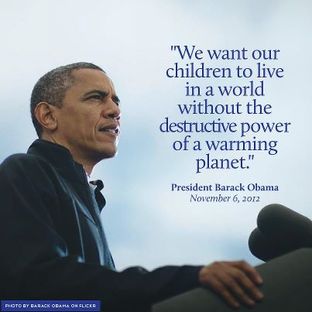 Image courtesy of tcktcktck He may not have achieved much on the climate front in his first term in office, but unlike Mitt Romney, Obama does at least seem to understand the extent of the threat posed by climate change. And - although constrained by the Senate and political will on the ground - he is likely to make more progress on emissions reductions or at least have a better chance of it than Romney. But at the same time, PwC's recent report argues that we are on course for a catastrophic 6C rise by 2100 without urgent measures, and finds that we need deep reductions in carbon intensity of 5.1% per year to 2050 - over six times greater than the 0.8 per cent average annual cuts achieved since 2000 - to avoid dangerous climate change. Such cuts will be a real challenge for even the most committed nations and the US - whether under Romn. And all the while, fossil fuel companies such as ExxonMobil are funding pseudoscience that will help to keep the public in a state of doubt and confusion for some years longer so their profits aren't compromised. The libertarian US Cato Institut based in Washington, DC, recently published its new report, Addendum: Global Climate Change Impacts in the United States - and it is designed to look just like the U.S. government’s official 2009 National Climate Assessment: 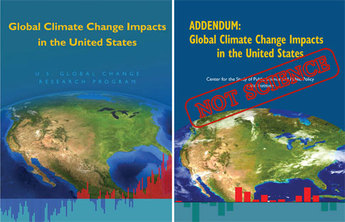 This was presented to Congress in 2009 as the federal government's best single evaluation of the science and potential impacts of climate change. Eleven authors of the original government report wrote a recent letter protesting what they called the “deceptive and misleading” Cato report: “The Cato report is in no way an addendum to our 2009 report. It is not an update, explanation, or supplement by the authors of the original report. Rather, it is a completely separate document lacking rigorous scientific analysis and review.” The Union of Concerned Scientists' 2007 report, Smoke, Mirrors, and Hot Air, detailed ExxonMobil’s campaign to use front groups to fund misinformation about climate change. They documented that Michaels was affiliated with no fewer than eleven groups funded by ExxonMobil. Two of the six-member author team on this new Cato report were also highlighted in their 2007 report - Robert Balling was affiliated with no fewer than five “front groups” funded by ExxonMobil. See also DeSmogBlog for other great pieces of investigative journalism on how vested interests have clouded awareness of climate science and impacts - we need to know what we're up against, as they have plenty of money and for a number of the fossil fuel companies it's certainly not matched by their scruples. |
Details
Archives
February 2019
Tags
All
|
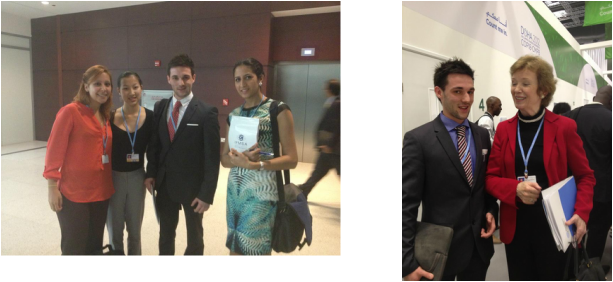
 RSS Feed
RSS Feed
